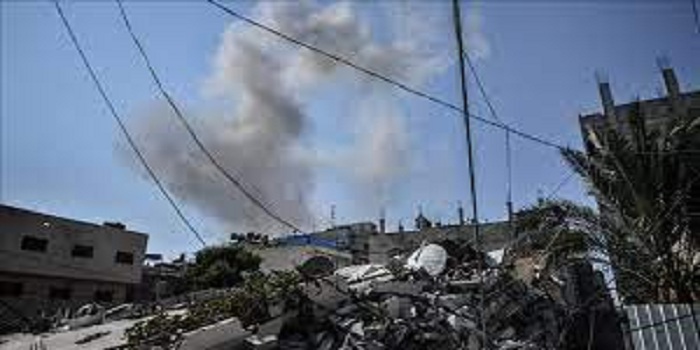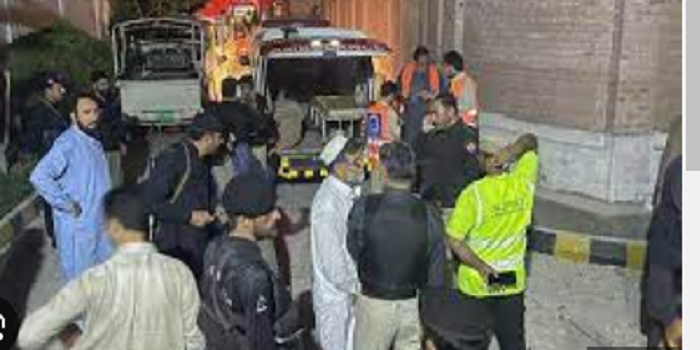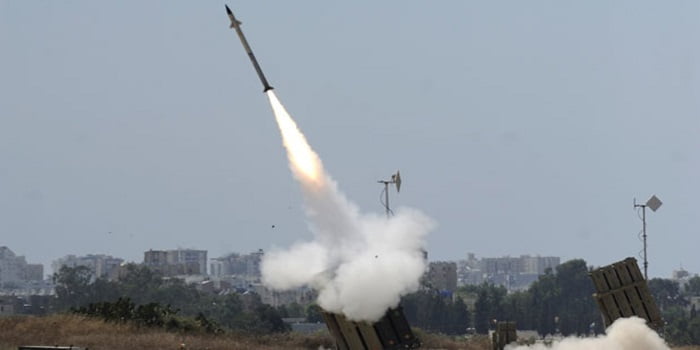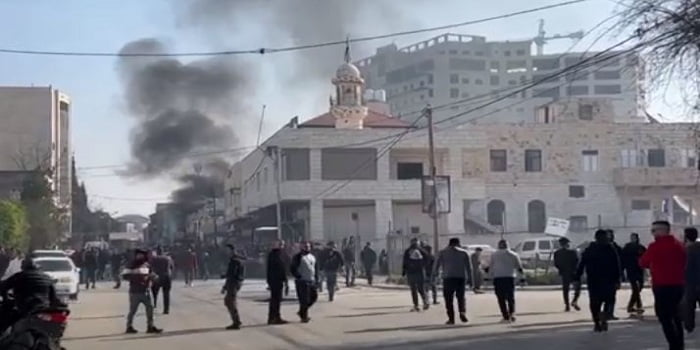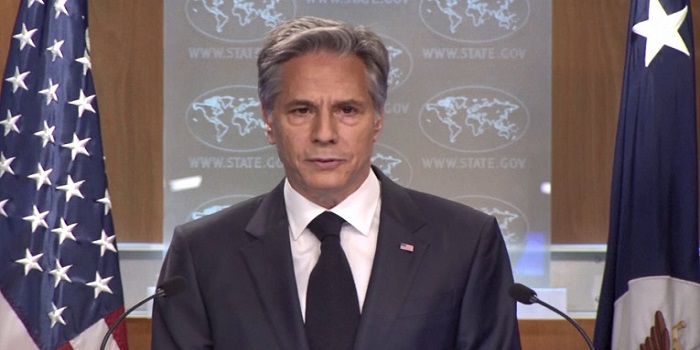‘Coming storm’ as expanded Israeli settler plan revealed

The Israeli government is planning unprecedented settlement activities in the West Bank, including the building of 18,000 housing units in the coming months, an Israeli newspaper revealed on Wednesday.
The move, which is seen as a serious threat to the Palestinians, was described by the Israeli newspaper Israel Today as a “revolution in Israeli politics in the West Bank” and a “mini-annexation.”
Under Israel’s One Million Settlers plan, approval will be given to thousands of settlements put on hold during the past two-and-a-half years.
The project also envisages the construction of 18,000 units in the coming months, along with the transfer of hundreds of thousands of settlers to the West Bank, and the registration of hundreds of thousands of Palestinians in official Israeli government data.
The Palestinian Ministry of Foreign Affairs said that the new Israeli government is engaged in a frantic race against time to impose new realities on the ground, which will leave talk of a two-state solution “unrealistic and irrational.”
It also undermines any opportunity for the establishment of a Palestinian state with East Jerusalem as its capital, and permanently closes the door on any international and regional efforts to resolve the conflict peacefully, the ministry added.
Yoav Gallant, Israel’s defense minister, met settler leaders and told them of a campaign for the demolition of Palestinian homes and facilities in all areas classified as C under plans announced by Prime Minister Benjamin Netanyahu.
The newspaper said that the new government will work to legitimize settlement outposts, including Avitar and Homesh, near Nablus, by amending the “separation/withdrawal” law and linking the sites to basic infrastructure.
The Israeli Civil Administration’s powers will be transferred from the Ministry of Defense to another ministry, facilitating settlement construction plans and paving new settlement roads.
The newspaper compared the plan to “a coming storm,” adding that it comes as responsibilities are organized between Gallant and Religious Zionism leader Bezalel Smotrich.
Meanwhile, Fatah spokesman Jamal Nazzal condemned the Israeli Knesset’s extension of emergency regulations that impose Israeli laws on settlements in the occupied West Bank, known as the “apartheid” law, for an additional five years.
Nazzal said the unilateral step directly threatened Palestinian rights. “The Israeli government’s approach of expanding the base of racist anti-democratic legislation threatens the rights of the Palestinian people in the territories occupied by Israel.
“Israel seeks to exploit the apartheid law to imprison Palestinians from the occupied territories inside Israel. This constitutes a violation of international law, which prohibits the occupying state from imprisoning residents.”
Palestinian political analyst Ghassan Al-Khatib told Arab News that the current Israeli government poses a greater threat to Palestinians than previous leaderships, especially in Area C and East Jerusalem.
“The issue of Al-Aqsa and Jerusalem will negatively affect Israel’s relations with the Arab countries. Expanding settlements in Area C will negatively affect Israel’s ties with both the EU and the US, which wants to keep the possibility of a two-state solution alive, while Israeli settlement activities endanger it,” Al-Khatib said.
In another development, a joint Palestinian-Israeli survey showed a continued decline in support for the two-state solution among both Palestinians and Israelis.
The Palestinian-Israeli Pulse opinion poll was carried out in December 2022 by the Palestinian Center for Policy and Survey Research in Ramallah and the International Program for Mediation and Conflict Resolution at Tel Aviv University.
It shows that support for the two-state solution dropped significantly from 43 percent in September 2020 to 33 percent among Palestinians and 34 percent among Jewish Israelis.
Two-thirds of Palestinians and 53 percent of Israeli Jews oppose this solution. Support remains unchanged among Arab Israelis, standing at 60 percent with 21 percent opposed, although this percentage is much lower than it was before 2020.
Support for the two-state solution now stands among all Israelis, Arabs, and Jews at 39 percent. These approval ratings among Palestinians, Israeli Jews and all Israelis are the lowest since the launch of the survey in June 2016 and the lowest since the start of the Oslo peace process in the early 1990s.
The respondents examined the idea of a confederation between two states, Israel and Palestine. They laid out its main details in five components, including freedom of movement, nationality and residence for refugees and settlers, Jerusalem, and the formation of joint authorities for civil affairs.
The results indicate an almost identical level of support among Palestinians and Israeli Jews for this idea, 21 percent and 22 percent respectively. The percentage for this among Arab Israelis is 59. Gazans were found more supportive of this than Palestinians in the West Bank.
The survey indicated that the one-state solution with equal rights receives the support of 20 percent of Israeli Jews, 44 percent of Arab Israelis, and 23 percent of Palestinians.
The one-state solution in which Israel controls and the Palestinians do not enjoy equal rights has the support of 37 percent of Israeli Jews.
On the other hand, a solution in which Palestine controls but the Jewish side does not enjoy equal rights would have the support of 30 percent of Palestinians and 20 percent of Arab Israelis.
The vast majority of Israeli Jews (84 percent) and 61 percent of Palestinians believe they do not have a partner for peace on the other side. Consequently, the two sides believe there is no chance of a peace agreement. Also, the results indicate that only 17 percent of the Palestinians believe that most Israelis want peace.
The poll shows that only 12 percent of Israeli Jews believe that most Palestinians want peace, compared with 33 percent in mid-2017, 35 percent in mid-2018, and 19 percent in 2020.
The largest percentage of both sides — 52 percent among Israeli Jews and 44 percent among Palestinians — believe the other side wants to wage a decisive war or resort to armed struggle.
Likewise, the largest percentage of Jewish Israelis (82 percent) and Palestinians (75 percent) believe that the other side will never accept its existence as an independent state.
The vast majority of Palestinian and Israeli Jews, 86 percent and 85 percent, respectively, believe that the other side cannot be trusted, while among Israeli Arabs, 50 percent think so.
“It is natural that support for the two-state solution declines and trust decreases between the Palestinian and Israeli peoples, with the existence of such an Israeli policy that adopts settlements and denies the rights of the Palestinians,” Al-Khatib said.
Meanwhile, following a meeting between Netanyahu and Jordan’s King Abdullah in Amman on Jan. 24 in which the Israeli leader pledged to preserve the status quo at Al-Aqsa Mosque, Itamar Ben-Gvir, Israeli national security minister, said: “I will continue my storming of Al-Aqsa in the future, and no one has sovereignty over it except Israel.”
Jordan has asked Israel to allow the construction of a fifth minaret on the eastern wall of the mosque to strengthen its guardianship of Al-Aqsa and its courtyards.
The request poses a challenge to Netanyahu, Israeli experts said.




